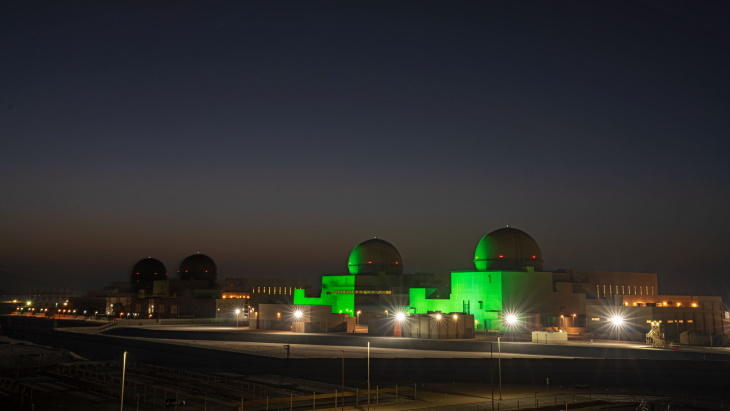Together with Barakah unit 1, which began commercial operation in April 2021, the output from Barakah 2 means that nuclear energy is now supplying 2800 MW to the UAE's grid and represents the half-way mark towards Emirates Nuclear Energy Corporation (ENEC)'s commitment to supply up to a quarter of the country's electricity needs.
"Less than a year after starting commercial operations for unit 1 back in April 2021, we have now successfully commenced commercial operations for unit 2 of the Barakah Nuclear Energy Plant, in accordance with UAE regulatory requirements and the highest international standards of safety and quality," Mohamed Ibrahim Al Hammadi, ENEC's managing director and CEO, told World Nuclear News.
ENEC has taken the lessons learnt from unit 1 and applied them to unit 2, helping it to achieve this latest major milestone in a more efficient way while ensuring all standards continue to be met, he said. "Given that the four APR-1400 Units at the Barakah Plant are built in pairs, this milestone marks the commercial delivery of the first two Units. This is only the second such occurrence in global history, after Shin Kori reactors 3 and 4 achieved commercial operations in 2016 and 2019 in South Korea," he said.
"Through the delivery of this milestone, we have further reinforced the UAE's energy security and our drive towards rapid decarbonisation of the UAE's power sector, significantly contributing to the UAE Net Zero by 2050 target. The Barakah plant is a sustainable powerhouse for the nation, generating clean electricity to power the UAE's economy and creating the foundation for new energy technologies such as hydrogen and synthetic fuels."
The unit is under the regulatory oversight of the UAE's Federal Authority for Nuclear Regulation (FANR). The regulator has confirmed that the plant's operator, Nawah Energy Company (Nawah), has met all regulatory requirements to reach this stage.
"The commercial operation of unit 2 of Barakah Nuclear Power Plant is a major milestone culminating immense efforts made over the past years since the establishment of the UAE Nuclear Energy Programme," FANR Director General Christer Viktorsson said.
"During that period, FANR reviewed every step of the nuclear power plant in terms of site selection, construction, testing and finally operation to ensure the operator complies with all regulatory requirements to ensure the safety of the public and the environment. FANR will continue to inspect the oversight activities for the Barakah Nuclear Power Plant during the operation phase to ensure all requirements are met."
UAE Minister of Climate Change and Environment Mariam Almheiri said the beginning of commercial operations for Barakah 2 was a "landmark milestone" for the UAE as it continues with the rapid decarbonisation of its power sector.
"The Barakah Plant is a powerhouse of sustainability and a key enabler for our ambitious Net Zero agenda," she said. "With further units due to come online, the significance of the Barakah plant in achieving Net Zero becomes ever more apparent, with all four units due to supply 25% of the UAE's electricity, while preventing 22.4 million tons of carbon emissions annually."
"I congratulate everyone at ENEC, Nawah, FANR and all the organisations involved in the Barakah project for what they have achieved so far and wish them every success in bringing online the final two units," World Nuclear Association Director General Sama Bilbao y Léon said. "More countries need to follow UAE's lead in building new nuclear capacity to deliver a net zero world and ensure reliable and secure energy supplies for the future."
Construction of the first of four Korean-designed APR-1400 units at Barakah, in the Al Dhafra region of the Emirate of Abu Dhabi, began in 2012. When complete, it will be one of the largest nuclear power plants in the world. Units 3 and 4 are in the final stages of commissioning: unit 3 is undergoing operational readiness preparations following the completion of construction in November 2021, and Unit 4 in the final stages of construction. Barakah as a whole is now more than 96% complete, ENEC said. The reactors are being built by a consortium led by the Korea Electric Power Corporation.















